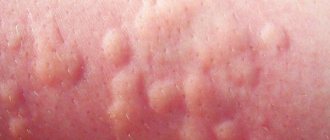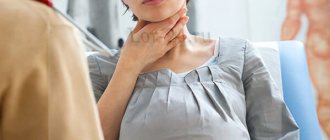Diarrhea during pregnancy, especially in the third trimester, is not a very pleasant and completely undesirable phenomenon. Carrying a child and giving birth is a long-awaited and important period in the life of any woman, and any deviations in the health of the expectant mother, in which diarrhea is noted, pose a certain danger to her and the baby. Let's look at the probable causes of diarrhea in the second and third trimesters of pregnancy, the characteristics of the female body's reactions during this period, and possible safe treatment.
Diarrhea is a bowel movement disorder in which the consistency and frequency of bowel movements changes. It can be episodic or repeated and is often accompanied by other unpleasant symptoms: intestinal colic, flatulence, fever and the development of dangerous dehydration. Therefore, the main treatment for severe diarrhea during pregnancy is rehydration therapy.
Causes
Diarrhea in the last stages appears for various reasons.
Approaching birth
Often, diarrhea signals that labor is approaching, especially if the diarrhea began between 35 and 41 weeks. The disorder in women occurs due to the fact that their body is already tired of bearing a fetus for many months. In the third trimester, the baby reaches a large size, the uterus expands and strongly compresses all organs.
If a woman feels cramping pain during diarrhea at 38-40 weeks, it is necessary to prepare for the imminent birth of a child. This manifestation is normal, since the female body begins to cleanse itself before childbirth.
Poisoning
Diarrhea when a woman is pregnant can occur due to poisoning from low-quality or spoiled foods. The problem is accompanied by an increase in body temperature, which aggravates the situation.
Also, pregnant women often cannot tolerate certain foods. Many women experience flatulence and loose stools after eating.
In addition, prolonged diarrhea is possible due to poisoning with drugs and household chemicals. Women should consult a doctor before taking medications, especially unfamiliar ones. But it is better not to use household chemicals at all, or to purchase ones that do not cause allergies.
Intestinal infection
Infections that damage the gastrointestinal tract include rotavirus, dysentery, enterovirus, and salmonellosis. With these infectious diseases, in addition to diarrhea, a woman develops a fever and begins vomiting.
With these symptoms, if the temperature reaches 40˚, pregnant women should urgently call a doctor, because diarrhea due to intestinal infections will most likely cause premature birth.
Gastrointestinal infections do not harm the health of the unborn child, since he is reliably protected from their influence in the uterus.
Diseases of internal organs
Very often, expectant mothers experience diarrhea due to various diseases of the gastrointestinal tract and other organs. But diarrhea appears for this reason if the disorders have already been diagnosed before conception.
Diarrhea in pregnant women mainly occurs due to the following diseases:
- Gastritis. This disease is characterized by inflammation of the gastric mucosa. Gastritis occurs for various reasons - it could be poor diet or constant stress. The disease takes a long time, especially if it is chronic. In order for remission to occur over a long period of time, a special diet is required. Pregnant women with this pathology should carefully monitor their diet, especially in the last stages. Read more about the causes, symptoms and treatment of diarrhea due to gastritis here.
- Cholecystitis. It affects the gallbladder. With cholecystitis, difficulties arise with the outflow of bile. The disease can be congenital and become more complicated during pregnancy.
- Pancreatitis. With this disease, inflammation forms in the pancreas. Pancreatitis is usually observed in people who tend to overeat fatty and fried foods, as well as in those who often overeat.
In addition to the listed diseases, diarrhea can be caused by chronic hepatitis, in which the liver becomes inflamed and deformed.
Hormonal changes
Loose stools in pregnant women often occur due to hormonal changes. During this period, women actively produce the hormone progesterone, which is responsible for the safety of the child.
Progesterone greatly affects the functioning of the intestines, knocking it out of its normal rhythm. All useful substances necessary for the proper functioning of the body are absorbed into the blood, due to which the formation of the child occurs.
Other reasons
In the third trimester, expectant mothers may experience increased stool frequency due to completely different factors:
- Parasites. During pregnancy, the female body is greatly weakened, since almost all useful substances are sent to the formation of the fetus. Therefore, a woman may develop helminths, which cause intestinal upset. With these infections, diarrhea is accompanied by poor health and allergies.
- Side effects. Pregnant women should take medications with caution, as many of them have one of the side effects - diarrhea.
If a woman suffers from diarrhea in the third trimester, she should contact her doctor. The manifestation may be caused by incorrectly selected drugs. - Allergic reaction. It often begins to torment pregnant women, because during the period of bearing a child the woman cannot tolerate certain types of foods. Stool upset is most often caused by nuts, such as peanuts, as well as seafood and cereals.
- Nerves and stress. Often, a pregnant woman experiences frequent mood swings. Even in the last stages, the expectant mother may experience irritability, nervousness or stress. This is a normal emotional state, but its downside is diarrhea. It occurs due to hormones that, under severe stress, speed up bowel function. They also activate peristalsis of the organ. The liquid is simply not absorbed and turns into softened feces. More about nervous diarrhea is written here.
Diarrhea in later stages
As your due date approaches, you may find that diarrhea becomes more common.
Your body may already be preparing for childbirth, but it is possible that this is not the case at all. Everything is individual! And every pregnant woman's experience will be unique. But in general, such a possibility does exist: the body begins to produce hormones that prepare you for the most important process - childbirth, and this is associated with cleansing the intestines. An important sign here is the absence of fever, nausea and vomiting. Therefore, if you are between 36 and 40 weeks, and diarrhea and cramping pain begin, we recommend calling an ambulance without delay. Have a successful and easy birth! Author of the publication: Anna Panina
Consequences of diarrhea in the third trimester of pregnancy
Diarrhea in any case is stress for the body. Diarrhea causes visible problems in the functioning of the female body, which can harm both the expectant mother and the child.
For woman
A disorder that occurs over a short period of time and is not accompanied by the above symptoms is a common occurrence and does not pose a threat to a woman. But if diarrhea does not stop for more than three to five days, the mother may become dehydrated. In this case, the body becomes very weak.
Diarrhea in the third trimester of pregnancy can cause premature labor. And this is affected not only by the enlarged fetus, which compresses the organs, but also by peristalsis, which disrupts the rhythm of the uterus, thereby activating the organ.
For a child
Diarrhea in the 35th week of pregnancy is very dangerous, since the problem undermines the overall health of the fetus, and it may be born with a very weak immune system.
A disorder in the third trimester is not desirable, since during this period the fetus actively builds up adipose tissue and requires more nutrients. And an intestinal disorder removes all useful microelements. Thus, the child does not receive the required volume.
Directions of therapy
Diarrhea during late pregnancy is uncommon. It cannot be ignored:
- The main direction of therapy for the expectant mother is detoxification of the body and prevention of dehydration. When fluid is lost, beneficial microelements are also washed out. A temporary lack of electrolytes negatively affects a woman’s well-being.
- If diarrhea occurs, it is recommended to drink plenty of water and take medications that normalize salt balance. A popular drug is Regidron.
- If a woman has food poisoning, then after consulting a doctor, you can take the sorbent recommended by him. It is necessary to follow the instructions exactly and not exceed the calculated dose. Drugs approved during pregnancy effectively remove toxins and help restore the body. Smecta and activated carbon are popular. Medicines do not penetrate into the systemic circulation. They are safe for the baby, but effective for the expectant mother.
With infections of various etiologies, diarrhea can be prolonged, without significant additional symptoms. In this case, consultation with a specialist is necessary. Based on the tests, he prescribes effective therapy for the disease. A doctor’s adequate view of the problem helps to quickly eliminate the causes. It is not recommended to neglect help.
When do you need a doctor's help?
The problem cannot be ignored in the last stages of pregnancy. Women suffering from the disorder should visit a doctor immediately. Diarrhea is not a disease, but it can alert you to dangerous diseases.
You need to make an appointment with a specialist if diarrhea continues for more than 5 days with pain, and at least one symptom accompanying the problem has been noticed. First of all, it is a headache and fever. Such factors foreshadow a rapid decline in immunity.
Among other things, diarrhea can be caused by parasites and viral diseases.
How to eliminate diarrhea in the third trimester of pregnancy?
Diarrhea begins due to various factors and can last 1-10 days. It is not recommended to start a bowel disorder. There are effective methods for eliminating diarrhea in pregnant women that do not harm either her or the baby.
Medications
Before taking any antidiarrheal drug, a woman should definitely visit a therapist or gynecologist. He prescribes safe medications based on the symptoms associated with diarrhea.
The following medications are allowed:
- Activated carbon, Smecta, Enterosgel and other products included in the sorbent group.
All medications are absolutely safe as they have no side effects. When medications enter the body, they “collect” all toxins and remove them. Sorbent group tablets cannot be mixed with any other means. - In the third trimester, a woman can already take the drugs Imodium and Loperamide without harm to the health of the unborn child.
- If diarrhea is accompanied by pain and cramps, the doctor should prescribe antispasmodics, for example, Papaverine or No-shpa.
- In the last weeks of pregnancy, if a specialist identifies any viruses that cause diarrhea, the antimicrobial drug Nifuroxazide may be prescribed.
- Since beneficial bacteria are removed from the body during stool liquefaction, a woman needs to take a course of Linex or Hilak Forte.
- If diarrhea is a consequence of stress, the woman will need sedatives that contain herbal ingredients. These may be Glycine, Novo-Passit, Magne B6.
A pregnant woman may also be prescribed a course of antibiotics if infections are detected. However, this is an emergency measure.
Folk remedies
It is possible to cure diarrhea that does not go away for several days without medications. Today, folk remedies are extremely effective. Traditional medicine has a lot of recipes and remedies, but not all of them are suitable during pregnancy. Allowed:
- Decoction of pomegranate peel. You will need to pour 200 ml of water with 2 tablespoons of chopped pomegranate peel. Boil the mixture and leave to steep for 15 minutes. Strain the resulting decoction and take 100 ml every three hours.
- Soothing infusions. Loose stools occur due to exciting situations and constant worries. In this case, soothing tea is useful. You can add any herbs to it, for example, mint and lemon balm are suitable. You can brew chamomile flowers.
- Oatmeal decoction. Mix 50 g of flakes and two glasses of boiling water, let it brew for 4 hours. Boil the mixture until the broth becomes mucous, then take 2 tablespoons 6 times a day.
- Berry jelly. The product contains rose hips and blackberries or a mixture of cranberries and lingonberries. How to prepare jelly for diarrhea is described in this article.
- Potato starch. It is safe and removes the problem in a short time. Starch is diluted with water - 1 tablespoon per glass of boiling water. Take twice daily.
Nutritional Features
If a pregnant woman experiences diarrhea in the third trimester, she should not immediately take pills or prepare herbal decoctions. Diet will help get rid of diarrhea. A proper diet will balance the functioning of the intestines and restore it after dehydration:
- The first day. On the first day, you should increase the amount of pure water consumed. Also, on the first day of the diet, you should drink only black tea, to which you can optionally add a sweetener, or rice water. You are allowed to eat white bread crackers.
- Second day. You can gradually introduce porridge cooked in water, fermented milk products and bananas into your diet. They have a fixative effect.
- Day three. Allowed are dishes from vegetables, steamed or cooked in the oven, lean meat, baked goods, preferably yesterday's. You need to continue to drink plenty of water and black tea. You can drink dried fruit compotes.
It is necessary to adhere to a similar eating regimen for a week. Afterwards, the expectant mother can gradually return to a normal diet, but she needs to exclude fast food, fried, fatty, smoked and any canned food from her diet.
Preventive actions
To avoid diarrhea during pregnancy, you should follow these recommendations:
- adhere to the diet prescribed by the doctor;
- avoid fatty foods, spicy foods, fast food;
- wash your hands before eating;
- thoroughly wash vegetables and fruits;
- avoid allergenic foods;
- properly store and prepare food.
The appearance of diarrhea in the last trimester of pregnancy is sometimes normal or indicates serious pathologies. To make an accurate diagnosis and select adequate therapy, you should consult a doctor.
Prevention measures
To prevent diarrhea from occurring in the third trimester, a woman needs to take preventive measures:
- Carefully monitor hygiene. Wash your hands before eating, after each trip to the toilet, and upon returning home.
- Pregnant women should avoid visiting cafes and restaurants, and also beware of street food.
- All vegetables, berries, and fruits must be washed before consumption. A woman should not get carried away with these products, because they provoke diarrhea.
- A woman should ensure that food does not spoil in the refrigerator.
- Avoid dehydration.
Diarrhea in the third trimester occurs for many reasons. A pregnant woman should not ignore the problem, as diarrhea can harm the baby's health. To get rid of stool disorders, there are effective and safe methods. But diarrhea can be prevented if you take preventive measures and listen to your body.
Previous post Why does diarrhea with vomiting occur during pregnancy and what to do about it?
Next entry Causes and treatment of diarrhea in late pregnancy











